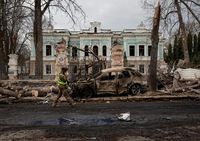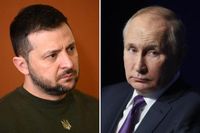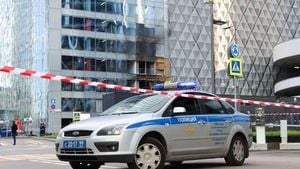In a dramatic escalation of hostilities, Ukrainian forces targeted the Russian 448th Missile Brigade on April 15, 2025, just two days after the brigade was responsible for a deadly missile strike on the northeastern city of Sumy that killed at least 35 people and injured over 100 on Palm Sunday, April 13. This missile strike was one of the deadliest attacks on Sumy since the beginning of the full-scale war, and it has raised significant concerns about the ongoing violence in Ukraine.
The Ukrainian General Staff reported that the attack on the Russian base in Kursk Oblast was executed by a coalition of military units, including the Unmanned Systems Forces, Special Operations Forces, and the Security Service of Ukraine. The strike reportedly caused a secondary explosion at the site, although the full extent of the damage is still being assessed. In a statement, the General Staff emphasized, "Every Russian military unit, subdivision, and their servicemen who shell peaceful cities and civilians in Ukraine will be identified and will definitely receive retribution." This assertion reflects Ukraine's commitment to retaliate against attacks on its civilian population.
Meanwhile, U.S. Special Envoy Steve Witkoff revealed on April 14 that his discussions with Russian President Vladimir Putin were centered around a potential peace deal involving five territories, which he did not specify. However, it is widely believed that these territories include Crimea and the partially occupied regions of Donetsk, Luhansk, Zaporizhzhia, and Kherson. Witkoff described the talks as "compelling," suggesting that they could lead to significant diplomatic progress, although concerns remain about the implications for Ukraine.
In a related development, a joint investigation by Reuters and the Open Source Center has uncovered that North Korean artillery shells are now dominating Russia's ammunition supply in Ukraine. According to the report published on April 15, 2025, North Korea has become a crucial military ally for Russia, supplying a substantial portion of the artillery shells used by Russian forces. Internal reports from Russia's Defense Ministry indicate that between 75% and 100% of artillery shells in some units are North Korean-made. This military cooperation, which began in earnest following a visit by Russian Defense Minister Sergei Shoigu to Pyongyang in July 2023, underscores the deepening ties between the two nations amid international sanctions.
As part of a broader military reform, the National Guard of Ukraine has formed two new military corps, which will be led by prominent commanders from the Azov and Khartiia brigades. National Guard Commander Oleksandr Pivnenko stated that this restructuring aims to improve battlefield efficiency and communication within the Ukrainian military. The formation of the 1st Azov Corps and the second corps led by Colonel Ihor Obolensky is seen as a response to the challenges faced by Ukrainian forces in coordinating their operations during the ongoing conflict.
On the Russian side, the Yamalo-Nenets Autonomous Okrug has become the first region to reduce military enlistment payments for soldiers fighting in Ukraine. Local officials announced that new recruits would now receive 1.9 million rubles (approximately $23,100), down from the previously offered 3.1 million rubles (about $37,700). This change follows a trend of increasing recruitment bonuses across Russia, which had been implemented to bolster troop numbers amid heavy losses on the battlefield.
The situation in Sumy has drawn international attention, particularly following the devastating missile attack on Palm Sunday. This attack not only resulted in significant civilian casualties but also raised questions about the effectiveness of U.S.-led peace negotiations. The attack was part of a broader pattern of escalating violence, with Russian forces increasingly targeting civilian areas in Ukraine. Just over a week prior, a similar strike on a residential district in Kryvyi Rih resulted in the deaths of 19 people, including nine children, marking it as one of the deadliest strikes verified by the UN since the start of the full-scale invasion in February 2022.
In response to the escalating violence, U.S. lawmakers are pushing for the Ukraine Support Act, which aims to provide security and reconstruction funding for Ukraine while imposing stringent sanctions on Russia. The act reflects growing concerns among U.S. legislators about the Trump administration's approach to the conflict and its willingness to engage in negotiations with Moscow.
Trump's comments on the recent attacks have sparked controversy, especially his characterization of the Sumy strike as a "mistake." Ukrainian officials have criticized this statement, urging for accountability and condemning it as a propagation of Russian narratives. Oleksandr Merezhko, a senior Ukrainian MP, equated Trump's remarks to downplaying the severity of the attacks, stating, "It’s like saying that 9/11 was just a ‘mistake’ by al-Qaeda." This sentiment has resonated with many in Ukraine, who view such statements as undermining their struggle against Russian aggression.
As the conflict continues, both sides are preparing for further military engagements. Ukrainian officials have indicated that they expect a renewed Russian offensive, particularly in the Sumy and Kharkiv regions, where Russian forces have been mustering for a significant push. General Oleksandr Syrskiy noted that the offensive had "effectively already begun," with a marked increase in enemy attacks observed in recent days.
The ongoing situation in Ukraine remains fluid, with the potential for further escalations in violence as both sides brace for continued conflict. The international community watches closely, as the implications of this war extend beyond Ukraine's borders, influencing global security dynamics and international relations.
As the world grapples with the ramifications of this conflict, the need for a comprehensive and lasting peace agreement remains urgent. However, with both sides entrenched in their positions, the path to peace appears fraught with challenges. The recent developments underscore the complexity of the situation and the dire need for diplomatic efforts to address the humanitarian crisis unfolding in Ukraine.







